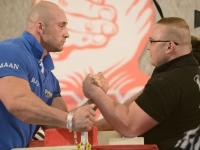What is the explanation for staring into your opponent’s eyes, what’s the psychological function of this? Does it have a name? Has it been used for long? It had to come from somewhere, and I don’t think it was invented by armwrestlers.
The staredown’s main function is showing someone their place. It is an evolutionary mechanism. If the opponent bows their head and turns their eyes away, that is a sign of submission. This was used not only by ancient warriors, it also appears in the animal world, for example – chimpanzees do it. A rival’s submission means a higher place in the hierarchy, it’s a demonstration of strength, aggression, courage, etc. There can be only one alpha male in a group.
Is the staredown a separate fight, a kind of foreplay?
Staredowns are the daily bread in sports, weigh-ins being a great example, when fighters stand opposing each other for photos. This is the first “trial of strength”, an attempt to dominate your opponent, to cause them to doubt their powers.
What is the deciding factor behind choosing intimidation techniques? Should we always use the tricks that work the best for us, or try to adapt to each opponent separately?
First and foremost, you need to be authentic, so you should always choose the methods in which you feel the best.
And what if the opponent resists a staredown, and picks up the challenge?
In the natural habitat (like a tribe or a pack of animals), submission was a means to avoid getting hurt by the stronger opponent. This was also good for the dominant specimen, because it saved them the necessity to fight every other rival, and thus get weakened. If a rivals refuses to yield, then there is a fight. In sports, the fight happens anyway, but the opponent’s morale might get weakened. This causes extra muscle tension, imbalance, errors, going into defensive mode, stress. The mental strength is as important as the physical power, technique or posture. That’s why the test of power before the fight is so important.
Our interviewee is Tomasz Folusz, psychologist, cognitive-behavioral psychotherapist, addiction therapist. He taught seminars in sports psychology, relaxation and motivation of contestants. He worked with several chess players.
www.psycho-terapeuta.warszawa.pl
Iza Małkowska

